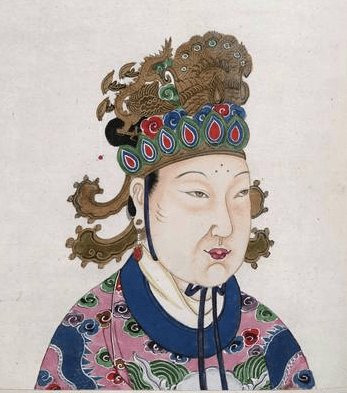The Empress Wang cooed over her stepdaughter. With no children of her own, she spoiled the child, only days old, and already loved her husband’s daughter like her own blood. She spent hours of the day in the child’s nursery. But she had duties to attend to. Bidding the girl and her nursemaid goodbye, the empress made her way out of the nursery. Moments later, the girl’s mother entered the room. Smiling down at the child, she smothered the helpless infant to death and exited the room, nodding at the maid. Later, she entered the nursery cheerfully with her lover, the Emperor and father of her children. They gazed into the child’s bassinet only to find the newborn blue and cold. The Emperor quickly turned to the nurse, demanding who had come to visit his daughter. Upon the answer that Empress Wang was the visitor, the emperor stormed out of the room, accusations of jealousy and murder already on his tongue. His lover smiled. This was the last straw. Empress Wang would be put aside. Wu Zhou, beloved mistress, mother, and favorite of the emperor, would take her place.1 “Well-behaved women seldom make history.”2
It is unbelievable that any woman would go so far as to murder her own child to seize power. Wu Zhou was relentless in ambition to rule. She began as a lesser member of the Inner Court of Emperor Taizong, where she met and fell in love with the Crown Prince Gaozong.3
It had been a year since his father’s passing and the young Emperor Gaozong still felt the grief in his heart, mourning for his father and mentor. As he approached the Buddhist monastery to pay his respects, a beautiful, familiar face caught his eye. The young nun was Wu Zhou, the maiden that had cared for him during his father’s illness. He pulled her into an embrace, happy to know that she was once again there to help ease him in his grief. He knew he was in love with her and he soon began making frequent trips to visit her in secret. His ever observant wife, Empress Wang, let him. In the eyes of the Empress, Wu Zhou was no threat to the crown.4
Emperor Gaozong brought his beloved to court as soon as custom dictated she was purified. In only a few years, she gave the emperor three sons and the daughter murdered in her bed, while the Empress remained barren. Empress Wang felt her connections to the nobles were no longer enough to hold Gaozong’s interest. As she struggled to maintain her power, Wu Zhou made powerful alliances with those underestimated by the powerful nobility, the harem, and servants closest to court action. These ladies, the nursemaid among them, became her closest allies and spies, allowing her to best her rivals time and again.5

Wu Zhou ascended the throne as Gaozong’s wife and Empress. She secured her place with four sons, each a viable heir to the throne. Her husband adored her. Behind the curtain that separated the outer court of men from the inner court of women, she learned the ways of the government. Under her husband’s watchful eye, she began to suggest political policies of her own. She convinced her husband to eliminate the nobles that supported the previous empress, consolidating her influence on the court. To replace them, the rulers established a policy where commoners were permitted to take civil examinations that would make them ministers, a role that beforehand was only filled by nobility.6 To the shock of the royal court, he allowed her participation in an ancient ceremony reserved for only the Emperor. They clearly operated as a team, calling themselves the “Two Sages.”7 This extended into the ailing final years of Gaozong’s reign, when the emperor proposed that Empress Wu rule in his stead during his prolonged illness. Outraged at the prospect of bringing a woman into the world of politics, the court rejected the proposal. Despite this, Empress Wu Zhou’s role in the Outer and Inner Courts had molded her into a shrewd, cunning, and outspoken political mind, surpassing her sons in experience and intellect.8
After the death of her husband, Dowager Empress Wu became regent for her son, Emperor Li Xian, before exiling and disposing of him only two months into his reign. She replaced him with Li Dan, her youngest and most obedient son, a “Momma’s boy.” With Li Dan as a figurehead, Dowager Empress Wu began to use her power honoring her ancestors, a traditional practice that emphasized filial duty and obedience. Through the elevation of her pedigree, Wu Zhou connected her lineage to the Zhou of antiquity, intent on creating her own dynasty.9
The ministers and nobility began to get extremely uncomfortable. They noticed how many of their colleagues that openly criticized the Dowager began to be appointed to stations far away from the capital. There were even tales of these minister encountering troubles in their travels, never arriving to their destination. They resented that this woman was essentially usurping their emperor. They feared the end of the Tang dynasty as more of the imperial Li family began to disappear to the various regions of the empire. So they began a plot to return the exiled Li Xian to the throne. The rebellion brought together the exiled supporters of the Li family, the sons of Gaozong. To the shock of the masterminds behind the plot, the common people did not care to rebel and the armies sided with the Empress. The rebellion was easily crushed.10
In the aftermath of this plot, masses of supporters gathered at the gates of the palace begging for the Dowager to become the Emperor. She refused. The next day the gates of the palace were again mobbed with supporters calling for Li Dan to abdicate in favor of his mother. But again, Wu Zhou refused to become Emperor. This continued for four days until finally, taking the show of popular support as a sign from Heaven itself, Wu Zhou crowned herself Emperor of China, founding a new Zhou dynasty.11
The most effective way Wu Zhao divided the loyalties of the elite under her was a bronze box for anonymous recommendations to the court. However, for fear of banishment or even death, it served to accuse other ministers of betraying the Emperor. Using the military to investigate these claims, most of the victims of these accusations were forced to commit suicide or were killed outright. Ruling with an uncompromising iron fist, no one dared to contest Emperor Wu Zhou’s authority aloud.12

Despite the chaos of a court divided, Wu Zhou proved her worthiness as a leader with the policy that as long as the working common people had their fill to eat, the state would remain strong. She supported farming specifically for the military, so the peasantry would not be forced to provide food for the army. Lastly, she implemented storehouses to be used in times of bad harvest or famine, which she had filled to capacity consistently. She supported many public works projects to improve her empire’s economy as well. She facilitated the rebuilding of canals and bridges to encourage trade and commerce. In addition, she funded the construction of improved irrigation systems across the empire.13
Throughout her reign, Wu Zhou was a great patron to the philosophies of Chinese culture. During her early time at court, Confucianism dominated the cultural practices of the elite. They had strict beliefs on gender roles. Under the codes of yin and yang, women were seen as personal and submissive with softness and gentleness, with no right to rule an empire. Men were seen to be public and dominant, displaying a firm and strong personality.14 Wu Zhou defied these traditional roles, so she was forced to legitimize her rule by alternate means. She proved faithful to tradition by displaying herself as the perfect daughter during her schemes to make her family worthy of a dynasty. She had the symbols of her name changed to include the symbols of the sun, representing yang, and moon, for yin. These were only a few of the traditions she employed to secure the throne.15
To soften the criticism she faced, Wu Zhou became a great proponent of Buddhism. She expanded the monasteries into great monuments and facilitated the building of new places of worship. She venerated Buddhist relics and elevated the religion over Daoism during her reign. A Buddhist prophecy had predicted that a female ruler and bodhisattva, an enlightened thinker, would come to rule over the empire. By linking Buddhism to her reign, Wu Zhou implied that she was this great saint sent to emulate the Buddha.16 However, in her old age Wu Zhou began to practice Daoism in an attempt to maintain her control as she became weaker and more feeble. She searched for the elixir of immortality, clinging to her position of power and wealth. She began showing disregard for the morality of court, inviting attractive young men to keep her company, stealing their youth to invigorate her and allowing her to remain on the throne.17

Wu Zhou is known among Confucian scholars for her reputation of ruthlessness and immorality. She was known to have had several affairs, especially in her old age, the stories of her undeniable and serene beauty followed her into her nineties. This sexual promiscuity was to the nobles’ greatest displeasure and they were sure to use this to slander her name. Her display of sexuality was so infamous, a novella was written about her indiscretion during the Ming dynasty a thousand years later.18 This was only one example of the slander of her name by Confucianists of her time. This continued well after her death, making it hard to tell what was truth and what was fiction. For example, there is no record of the murder of the newborn princess that aided Empress Wu in gaining the throne, only that her predecessor could not provide an heir. Every detail throughout Wu Zhou’s reign was carefully examined. All wrongs, whether it be rebellion or natural disaster, was a sign that the Emperor had lost the mandate of Heaven.19
Wu Zhou was a woman of extraordinary power, who forced the Chinese empire to kneel before her. She is the exception to the rule that women are not of the right constitution to rule. Her ways were wicked and cruel, a product of her gender and the traditions of her people. Ultimately, her intelligence, cunning, and tact in court made her an undeniably remarkable ruler in Chinese history.
- N. Harry Rothschild, Wu Zhao: China’s Only Woman Emperor (New York: Pearson Education, 2008), 31-32. ↵
- Laurel Thatcher Ulrich. ↵
- N. Harry Rothschild, Wu Zhao: China’s Only Woman Emperor (New York: Pearson Education, 2008), 27-28. ↵
- N. Harry Rothschild, Wu Zhao: China’s Only Woman Emperor (New York: Pearson Education, 2008), 29. ↵
- N. Harry Rothschild, Wu Zhao: China’s Only Woman Emperor (New York: Pearson Education, 2008), 29-35. ↵
- N. Harry Rothschild, Wu Zhao: China’s Only Woman Emperor (New York: Pearson Education, 2008), 37-48. ↵
- N. Harry Rothschild, Wu Zhao: China’s Only Woman Emperor (New York: Pearson Education, 2008), 49-64. ↵
- Women in World History: A Biographical Encyclopedia, 2002, s.v. “Wu Zetian,” by Jennifer W. Jay. ↵
- N. Harry Rothschild, Wu Zhao: China’s Only Woman Emperor (New York: Pearson Education, 2008), 82-89. ↵
- Encyclopedia of World Biography, 2004, s.v. “Wu Chao” by Paula K. Bryers and Suzanne Michele Bourgoin. ↵
- N. Harry Rothschild, Wu Zhao: China’s Only Woman Emperor (New York: Pearson Education, 2008), 157-158. ↵
- N. Harry Rothschild, Wu Zhao: China’s Only Woman Emperor (New York: Pearson Education, 2008), 125-136. ↵
- N. Harry Rothschild, Wu Zhao: China’s Only Woman Emperor (New York: Pearson Education, 2008), 172-173. ↵
- Xianlin Song, “Re-gendering Chinese History: Zhao Mai’s Emperor Wu Zetian,” East Asia: An International Quarterly 27, no. 4 (December 2010): 365. ↵
- N. Harry Rothschild, Wu Zhao: China’s Only Woman Emperor (New York: Pearson Education, 2008), 120-124. ↵
- N. Harry Rothschild, Wu Zhao: China’s Only Woman Emperor (New York: Pearson Education, 2008), 137-156. ↵
- N. Harry Rothschild, Wu Zhao: China’s Only Woman Emperor (New York: Pearson Education, 2008), 181-204. ↵
- Women in World History: A Biographical Encyclopedia, 2002, s.v. “Wu Zetian,” by Jennifer W. Jay. ↵
- Xianlin Song, “Re-gendering Chinese History: Zhao Mai’s Emperor Wu Zetian,” East Asia: An International Quarterly 27, no. 4 (December 2010): 367, 372. ↵



55 comments
Azeneth Lozano
Wow! The hook for this article is grasping that throughout the whole article kept me entertained yet informed. It’s fanaticizing to learn about the female emperor that is never talked about. I have never heard of her story, but I am impressed with how she became emperor during this time given the strict gender roles during this era. Overall, this a well-written article with a great introduction about an unheard-of story.
Trenton Boudreaux
I never would have thought that the Civil Service Examination system in ancient china, which provided both commoners and noblemen the opportunity to rule, would have been expanded to include said commoners by such a controversial figure and a woman, given the strict gender roles China enforced at the time. A very well written article on a very important historical figure
Charli Delmonico
This article had a very good attention grabber– I most certainly wasn’t expecting the story to claim that Zhou had killed her own daughter just to assume the throne. I find it very interesting that I haven’t heard more about this cunning woman. I can’t believe she also banished her own son after killing her daughter in the previous years, and I can’t believe she would have people killed for disagreeing with her openly. She was absolutely ruthless.
Analisa Cervantes
Emperor Wu Zhao is an example of a woman who is not to be underestimated. She is the type of person who would do anything to gain power even killing her own child if it means ruling at the side of the Emperor. The Empress Wang is an example of a person who is caught in the middle. She was betrayed by her servants and sister-wife and it cost her her life.
Elizabeth Maguire
This article was very interesting and very informative. Prior to reading this article I had no Idea China had such a powerful and ruthless female empress like Emperor Wu Zhao. It’s a shame that in the West she often isn’t even mentioned in world history classes, despite being the founder of a new dynasty. To even think of killing one’s own offspring, male or female, is just so sickening and heart-breaking.
Aaron Peters
I had no Idea China had such a powerful and ruthless female empress, It’s a shame that in the West she often isn’t even mentioned in history classes, Despite being the founder of a new dynasty. The author did an amazing job documenting the history of this nearly forgotten empress of China. Wu Zhou was able to use all of her intelligence and cunning to become the ruler of one of the most powerful nations at the time.
Amelia Hew
Empress Wu Zhou was certainly a ruthless and power thirsty woman. She was willing to sacrifice her own daughter in order to become the empress even if we never know whether it’s true or not. But you have to admit she was a charismatic leader of China and brought great prosperity for her country. Her talents from politics to literatures and her dominant demeanor in court are equal, if not surpasses men of her time but like all great rulers of China she was not excluded from the desire of gaining eternal youth and immortality which results in her losing her morality as days pass. This article shows exactly how unique Empress Wu Zhou is and how her actions effects the people of her country.
Maya Mani
I love the story telling aspect of this article. The introduction was extremely well written and was able to convey the event so well. The article isn’t just a report about a person, but an actual experience took place thousands of years ago. While she was definitely a strong ruler who had the qualities of leadership, there is absolutely no way that killing your own child is justifiable.
Antonio Coffee
This article was striking and told a gripping story that I have never heard before. Wu Zhou was vicious and was supper tactical in her decisions. She knew what people would react to and how to get the reactions she wants out of people and the citizens. She was smart to appear reluctant to take the title of the emperor so that she did not appear power hungry and the people would flock to her.
Matthew Swaykus
This article began in an incredible fashion. I have to applaud how the author chose to introduce the audience with this moment and for the clever usage of the quote “Well-behaved women, seldom make history.” It was incredible execution by the author. The author also makes great use of dramatic irony in this piece by depicting the two Empresses before and after the merciless power play made by Wu Zhou in the beginning of this piece.